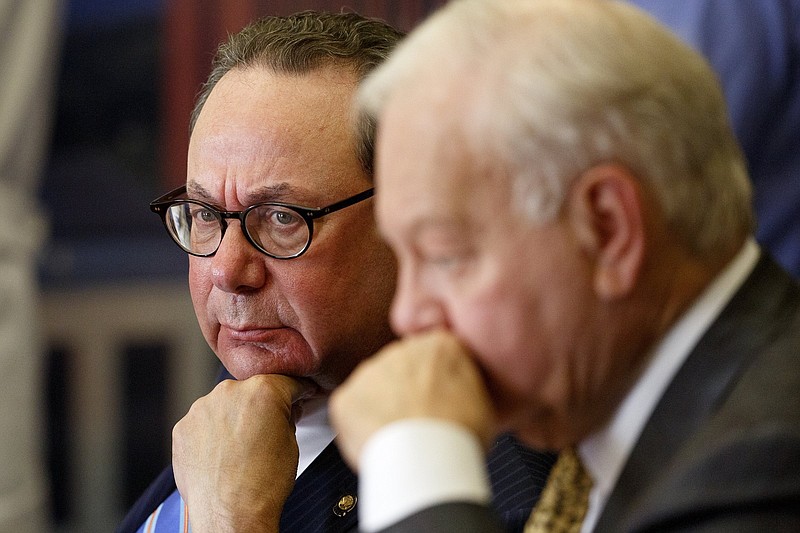In early May, physicians - fed up with three years of unanswered concerns about patient safety at Erlanger's emergency department - took the extreme action of making a "no confidence" vote on the hospital's top management, specifically hospital CEO Kevin Spiegel and two of his aides. On Thursday - nearly four months later - the Erlanger Health System Board of Trustees decided to talk about it publicly, briefly.
But, patients, don't get your hopes up. Nothing came of it. The board tabled the discussion.
The truth is, they probably wouldn't have said or done this much had the no-confidence vote and the letter not become public thanks to whistleblowers and the dogged determination of Times Free Press reporter Elizabeth Fite and her editors.
Fite's first story about the matter was published on June 23, and it outlined medical staff concerns about chronic operational issues, such as inefficiency, understaffing, poor morale and policies that cause overcrowding in the emergency department and operating rooms - all items that were detailed in the Medical Executive Committee's letter to the board dated May 9.
"Patient safety issues have been raised with management since 2015," the physicians wrote in that letter. "Despite over 3 years of complaints and concerns by patients and physicians, hospital management has been ineffective in addressing these issues. There exists a lack of accountability in senior management who are either unable or unwilling to effect necessary changes to insure patient safety."
Some argue that the real physician "concern" is money. Spiegel increasingly is hiring doctors and buying medical practices (for more money), rather than contracting with them. Some say the contract doctors want the autonomy they now have, but also want the extra money that some employed doctors get.
Whatever the back story, did the board get busy right away? We don't know.
Erlanger is a public hospital, and the board is required by law to govern the hospital in public meetings. Board Chairman Mike Griffin, in a statement a few days later, said Erlanger's proposed fiscal 2020 budget would address many concerns outlined in the letter. Other trustees chose not to talk. A few days later at the next board meeting, the only discussion was to complain that the letter was leaked to the newspaper and the newspaper wrote about it.
That same whine came up Thursday at the specially called meeting, but this time, it was clear that at least some board members finally had gotten the message.
"Under pressure from doctors, hospital board wades into concerns over Erlanger leadership: Erlanger CEO Kevin Spiegel's fate in question," reads the headline on the Times Free Press digital publication of the story.
Spiegel took the reins of Chattanooga's only public hospital - the largest regional provider of care for indigent patients - in April 2013 after serving as CEO at Methodist Healthcare in Memphis for five years.
He was hired in a 16-minute meeting after trustees returned from a 45-minute closed meeting they said was about "parliamentary procedure." With no discussion about any of the three candidates, one board member threw out Spiegel's name and in a 5-3 vote hired him for $680,000 a year. The remainder of the meeting was spent taking another vote to have the meeting minutes state that the Spiegel vote was "unanimous."
Spiegel trades in vision and talk of expansions. He steered the hospital on a $40 million building campaign for the first phase of a "new" Children's Hospital. Actually it's not yet a hospital. For now, it's a really spiffy children's outpatient facility - complete with an 1891 steam locomotive out front, hang gliders from Lookout Mountain inside and a firetruck on the third floor. The children's actual hospital facilities remain exactly as they've always been.
As smaller hospitals across the state closed after Tennessee didn't expand Medicaid, Spiegel's "expansion" mindset benefited. Six years after his hire, Erlanger has become the nation's 10th largest public hospital and seen a 92% increase in net patient revenue, market share growth and improved bond ratings.
After the no-confidence vote, Spiegel, who now makes $964,000 a year, attributed some of the concerns to that very growth and expansion, and that's certainly true. But where was the necessary on-the-fly planning to make room for the onslaught of new patients? Where were the needed additional nurses?
In Thursday's meeting, Griffin got right to the point, saying that the chronic operational problems outlined in the letter - inefficiency, understaffing, poor morale and policies that cause overcrowding in the emergency department - have improved, but some doctors are still unhappy with the hospital system's executive leadership.
"Our question of the hour now is: where do we go now with our leadership?"
Before anyone else spoke, trustee Gerald Webb made a motion to table that discussion. Webb said not enough trustees were present, although eight of the 11 were in the room and two others participated by phone. Only one wasn't in touch. Just like that, the board agreed no vote would be taken Thursday.
How about that, patients? Is your confidence restored in your public hospital? Do you feel the board is transparent in examining the care you receive?
Tune back in after another four months or so. Maybe we'll have answers by then.
